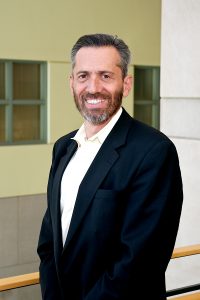Two Cleveland researchers receive $18.5 million to continue legacy in rheumatic, immunologic disorders and infectious disease

Building on its previous gifts to Cleveland Clinic and Case Western Reserve University School of Medicine, the Richard J. Fasenmyer Foundation awarded $18.5 million in new grants that will support collaborative research efforts, physician recruitment and sustain into perpetuity the Richard J. Fasenmyer Center for Clinical Immunology at Cleveland Clinic.
The award supports the joint efforts of immunologists Leonard Calabrese from the Cleveland Clinic and Michael Lederman from Case Western Reserve University School of Medicine, two nationally recognized investigators of HIV/AIDS who were among the first researchers to study the virus. The researchers will continue their nearly 40-year collaboration to investigate potential relationships between autoimmune, inflammatory diseases, such as rheumatoid arthritis, and HIV/AIDS.
“It is an inspirational gift for both of us,” explained Calabrese, who also serves as the Richard J. Fasenmyer Chair of Clinical Immunology and is the director of the Richard J. Fasenmyer Center for Clinical Immunology. “Our life-long vision will continue as new generations of physician scientists join in our efforts to advance breakthroughs in the growing scientific area where immunologic and infectious diseases intersect. The support of the Richard J. Fasenmyer Foundation fuels our continued efforts to provide patients with the best and most advanced care and allows us to further research and education in this growing field.”
The new funding focuses on the establishment of a collaborative catalytic fund to support the ongoing partnership between Cleveland Clinic and Case Western Reserve University School of Medicine in the fields of autoimmunity, autoinflammation and infectious diseases especially HIV infection in perpetuity. Support also includes funding for recruitment and support of junior faculty who will be the next generation of leaders in these important fields, as well as the development of a peer-reviewed Journal of Interesting Immunology and Infectious Diseases at the School of Medicine and Cleveland Clinic. The first of its kind, this journal will share the biomedical and immunologic research of physician-scientists worldwide. The gift will also support the creation of a dual-track training program in rheumatic and immunologic infectious diseases.
“This generous support will enable us to carry out our research and leverage the strengths of our organizations,” added Lederman, who serves as the Scott R. Inkley Professor of Medicine and co-director for Aids Research at the School of Medicine and University Hospitals Case Medical Center and principal investigator at the Clinical Trials Unit. “Behind all of our research is the drive to understand better the determinants of disease that will allow us to better care for persons with HIV infection, and with other infectious and inflammatory diseases.”

The commitment also supported creation of the inaugural Richard J. Fasenmyer Professorship in immunopathogenesis at the university’s School of Medicine. Last month, the school held a chairing ceremony to recognize its first recipient, Rafick-Pierre Sékaly, one of the world’s leading scientists in AIDS research, human immunology and immunotherapy.
Calabrese and Lederman have been collaborators and close friends since the early days of the HIV epidemic. In 1983—two years after AIDS was first found in the U.S.— Case Western Reserve University researchers published findings that AIDS is transmitted in blood products. They have worked together on numerous projects, including efforts to gain early insights into factors affecting HIV/AIDS transmission, studying immunologic mechanisms of disease, and investigating the efficacy of various immunologic therapies.
The Fasenmyer Foundation began its long-standing partnership with Cleveland Clinic through a $5 million commitment that established the Richard J. Fasenmyer Chair in Clinical Immunology, currently held by Calabrese, and the Richard J. Fasenmyer Center for Clinical Immunology. The endowed chair and center expands Cleveland Clinic’s commitment to the investigation of immunological diseases including autoimmune disorders as well as infectious diseases especially chronic viral infections such as HIV/AIDS and the pursuit of better treatments for people with these devastating diseases. In addition, it has made a significant impact to public and professional education within the field of immunology.
The Fasenmyer Foundation began supporting the collaboration between Drs. Lederman and Calabrese in 2009 and their groundbreaking research that examines why many well-treated HIV patients fail to achieve a restored immune system despite effective therapy. In 2011, the foundation awarded a $3 million gift to expand this project while supporting the ongoing research into the potential relationships between autoimmune, inflammatory diseases, such as rheumatoid arthritis, and HIV/AIDS.
To date, the Fasenmyer Foundation’s support totals more than $27 million and has rapidly generated important findings that catalyze novel research and has served a pivotal role for bringing more than $30 million in additional research funding from the National Institutes of Health.
“This grant recognizes 36 years of dedication and collaborative research of Drs. Calabrese and Lederman and between Cleveland Clinic and Case Western Reserve University—the visionary institutions that support their work. Our investment affirms not only the concern for others that our founder, Richard Fasenmyer, showed during his lifetime, but also that the interplay of research and clinical care are critical to creating a future without infectious disease,” said John Baechle, board president, Richard J. Fasenmyer Foundation. “We are honored to have played a role in securing protected time and resources necessary to advance their important research.”
